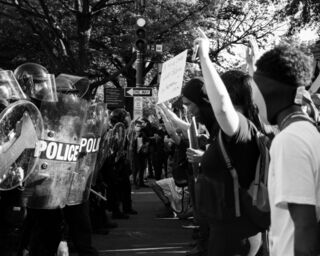Personality
The Problem of Police Brutality
And the personality science solution.
Posted July 7, 2020 Reviewed by Jessica Schrader
The cases of George Floyd and Breonna Taylor represent just two recent and horrific examples of police brutality resulting in unnecessary loss of human life. The awfulness of these cases is amplified by the fact that Black Americans—both George Floyd and Breonna Taylor are Black—are more than 2.5 times as likely to be killed by police than white Americans. Although statisticians, social scientists, and activists dispute the root cause of this difference (e.g., systemic racism, crime rates, culture, socioeconomics), one thing is for sure: When a police officer takes the life of another person, the responsibility for doing so lies ultimately with that officer.

Personality refers to the ways in which people think, feel, and act differently from one another. Some people think doctors can be trusted, others do not. There are movies that some people love and other people hate. Some people make their bed every morning, others do not. Virtually every difference between people is related to personality. Police officers, like all people, differ in how they respond to situations they encounter. Where one police officer sees threats and responds violently, another does not.
The deadly encounters with the police over the past decade or so have led to repeated calls for police reform. In 2018, for example, the New York Police Department began a program for implicit bias training. Similar programs already had been adopted across the United States, though the effectiveness of these programs has been seriously questioned. Most recently, the city council of Minneapolis voted to defund the city’s police department. Although some attempts at police reform are better than others, it is important to ask ourselves whether training, education, and policy reform are even the right place to start in dealing with police brutality.
In a stand-up comedy routine that went viral, Chris Rock stated what many of us already know. Police work is difficult, risky, and inherently dangerous. The people who dedicate their lives to serving and protecting their communities deserve the utmost respect. But, as Mr. Rock also points out, “In some jobs, everybody has to be good.” You cannot have mistakes. You cannot have “just a few bad apples.” The best way to keep bad apples out of your barrel is to avoid picking bad apples in the first place. The best way to avoid police brutality is to avoid hiring people who are likely to resort to unjustifiable, violent, and life-ending tactics when they are under pressure.
Personality psychology has a long history of helping communities hire better police officers. Unlike the clinical assessments of old that were used to diagnose personality disorders (e.g., the MMPI), modern personality assessments are used to predict everyday work behavior, how effectively people do their jobs, and how people respond under stress. Moreover, well-designed assessments promote diversity and inclusion by providing an unbiased view of a job candidate’s fit for a given job. That is, men and women get the same average scores and people of different ethnicities get the same average scores. In short, scientifically validated personality assessments provide an accurate and fair way to hire better police officers, reduce police brutality, and rebuild the respect and admiration that police officers deserve.
This post was co-authored by Chase Winterberg, M.A., J.D.


